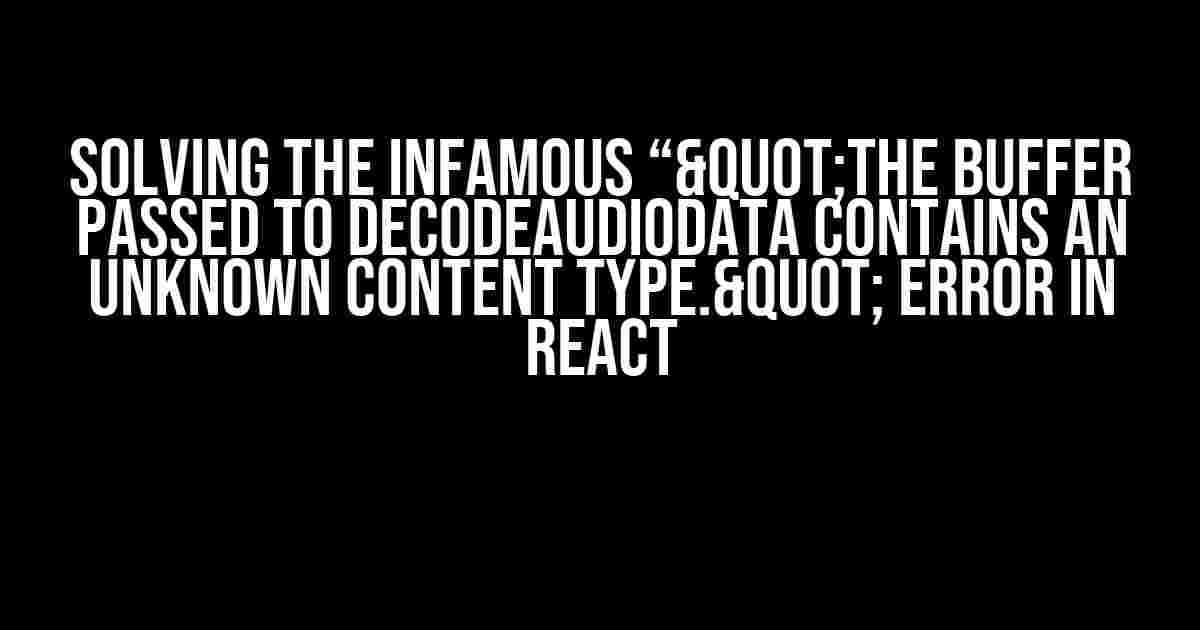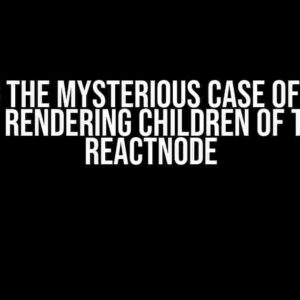Are you tired of encountering the frustrating “"The buffer passed to decodeAudioData contains an unknown content type." error in your React application? Do you find yourself scratching your head, trying to figure out what’s going on with your audio decoding? Fear not, dear developer, for you’re not alone! In this comprehensive guide, we’ll dive into the depths of this error, explore its causes, and provide you with practical solutions to get your audio working smoothly.
What is the “"The buffer passed to decodeAudioData contains an unknown content type." Error?
The “"The buffer passed to decodeAudioData contains an unknown content type." error typically occurs when you’re trying to decode audio data using the Web Audio API’s decodeAudioData() function. This error is often accompanied by a cryptic error message that leaves you wondering what’s going on.
Uncaught DOMException: Failed to execute 'decodeAudioData' on 'BaseAudioContext': The buffer passed to decodeAudioData contains an unknown content type.
at :1:1 Causes of the Error
Before we dive into the solutions, it’s essential to understand the root causes of this error. Here are some common reasons why you might encounter this issue:
- Invalid Audio Format: The audio data you’re trying to decode is in an unsupported format. The Web Audio API only supports a limited set of audio formats, including WAV, MP3, and Opus.
- Corrupted Audio Data: The audio data you’re trying to decode is corrupted or incomplete, leading to the error.
- Incorrect MIME Type: The MIME type of the audio data is incorrect or missing, causing the Web Audio API to reject it.
- Missing or Incorrect Headers: The HTTP headers accompanying the audio data are missing or incorrect, leading to the error.
Solutions to the Error
Now that we’ve explored the causes, let’s get to the solutions! Here are some practical steps to help you resolve the “"The buffer passed to decodeAudioData contains an unknown content type." error:
Verify the Audio Format
Ensure that the audio data you’re trying to decode is in a supported format. You can use tools like FFmpeg or online audio converters to convert your audio files to a supported format.
ffmpeg -i input.mp3 -c:a libopus output.opusValidate the Audio Data
Use a tool like `mediainfo` to validate the audio data and ensure it’s not corrupted or incomplete.
mediainfo --inform="%" input.opusSet the Correct MIME Type
When serving the audio data, ensure that the correct MIME type is set in the HTTP headers. For example, if you’re serving an Opus file, set the `Content-Type` header to `audio/opus`.
HTTP/1.1 200 OK
Content-Type: audio/opus
Content-Length: 1024
Include Required Headers
Verify that the required HTTP headers are included when serving the audio data. The `Content-Type` and `Content-Length` headers are essential for the Web Audio API to function correctly.
HTTP/1.1 200 OK
Content-Type: audio/opus
Content-Length: 1024
Accept-Ranges: bytes
Use the `arrayBuffer` Property
When decoding the audio data, use the `arrayBuffer` property to access the raw audio data. This can help bypass any issues with the MIME type or headers.
fetch('/audio.opus')
.then(response => response.arrayBuffer())
.then(arrayBuffer => {
// decode the audio data using decodeAudioData()
});
Best Practices for Working with Audio in React
To avoid encountering the “"The buffer passed to decodeAudioData contains an unknown content type." error in the future, follow these best practices when working with audio in React:
- Use Supported Audio Formats: Stick to supported audio formats like WAV, MP3, and Opus to ensure compatibility with the Web Audio API.
- Validate Audio Data: Regularly validate your audio data to ensure it’s not corrupted or incomplete.
- Set Correct MIME Types: Always set the correct MIME type in the HTTP headers when serving audio data.
- Use the `arrayBuffer` Property: When decoding audio data, use the `arrayBuffer` property to access the raw audio data.
Conclusion
The “"The buffer passed to decodeAudioData contains an unknown content type." error can be frustrating, but with the right knowledge and techniques, you can overcome it. By understanding the causes of the error and implementing the solutions outlined in this guide, you’ll be well on your way to decoding audio data like a pro! Remember to follow best practices when working with audio in React, and don’t hesitate to reach out if you have any further questions or concerns.
| Cause | Solution |
|---|---|
| Invalid Audio Format | Verify the audio format and convert it if necessary |
| Corrupted Audio Data | Validate the audio data using tools like mediainfo |
| Incorrect MIME Type | Set the correct MIME type in the HTTP headers |
| Missing or Incorrect Headers | Include required headers like Content-Type and Content-Length |
Now, go forth and conquer the world of audio in React!
Frequently Asked Question
If you’re struggling with the infamous error “The buffer passed to decodeAudioData contains an unknown content type” in your React application, you’re in luck! We’ve got the answers to your burning questions.
What causes the “The buffer passed to decodeAudioData contains an unknown content type” error?
This error typically occurs when the audio data passed to the decodeAudioData function is not in a format that the function can recognize. This might happen if the audio data is corrupted, or if the MIME type is not set correctly.
How do I fix the “The buffer passed to decodeAudioData contains an unknown content type” error?
To fix this error, make sure that the audio data is in a valid format (such as WAV or MP3) and that the MIME type is set correctly. You can also try using a library like FileSaver.js to save the audio data to a file and then read it back in to ensure that it’s in the correct format.
What are some common mistakes that lead to the “The buffer passed to decodeAudioData contains an unknown content type” error?
Common mistakes that can lead to this error include passing an empty buffer to decodeAudioData, not setting the MIME type correctly, or passing a buffer that contains data that is not audio. Make sure to double-check your code and ensure that the buffer is valid and contains audio data.
Can I use the “The buffer passed to decodeAudioData contains an unknown content type” error to debug my audio code?
Yes, this error can be a valuable debugging tool! By checking the error message, you can determine what’s going wrong and where in your code the error is occurring. Use this error to your advantage to track down and fix issues with your audio code.
Are there any workarounds for the “The buffer passed to decodeAudioData contains an unknown content type” error?
If you’re stuck with this error and can’t seem to fix it, one workaround is to use a library like pizzicato.js, which provides an alternative to decodeAudioData. However, be aware that this may not be the most efficient or optimal solution, and it’s still worth trying to fix the underlying issue.



